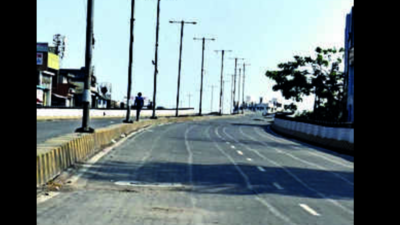Top Searches
- News
- City News
- ahmedabad News
- Hatkeshwar flyover: Ahmedabad Municipal Corporation kept avoiding crucial NDT tests
Hatkeshwar flyover: Ahmedabad Municipal Corporation kept avoiding crucial NDT tests

NDT tests are conducted for estimating compressive strength, estimating the concrete quality in relation to standard requirement, detection of presence of cracks, voids and other imperfections and identifying areas of the flyover.
AHMEDABAD: Back in March 2021, when the first pothole had appeared on Rs 39 crore Hatkeshwar bridge, documents show a meeting involving the contractor, civic body engineers and the consultant for the flyover had opined a set of non-destructive tests (NDT) to be performed on the flyover to ascertain the quality of concrete and whether the flyover was a danger to public safety. The move was resisted by the civic body's engineering department for almost one and half years till chunks of concrete began to fall off in three separate instances recorded in 2022 - in February, June and then in August.
NDT tests are conducted for estimating compressive strength, estimating the concrete quality in relation to standard requirement, detection of presence of cracks, voids and other imperfections and identifying areas of the flyover with lower integrity in comparison to other parts.
The contractor Ajay Engineering Infra Pvt Ltd had begun construction work in 2015 and the flyover was thrown open to the public in 2017. Initially in May 2021, two months after, the first pothole had appeared, a private lab CIMEC had performed a standard NDT test called the hammer rebound test, which revealed that the quality of concrete was four times less than the standard meant for M45 concrete.
However, it was only after five potholes were sighted till 2022 that the state roads and buildings department demanded a comprehensive set of NDT be performed in September 2022.
These tests included the ultrasonic pulse velocity tester, rebound hammer test, pull-off, pull-out and break-off tests, core-drilling test, and permeability tests. "Recently after four private consultants submitted their reports on the concrete compression strength, IIT Roorkee too had been approached to conduct tests on the flyover," reveals a senior AMC official.
Even after the private consultants opined that another set of NDT tests were to be performed, the opinion was resisted once again in 2022. The private labs engaged by the AMC, which included CIMEC, KCT, e-cube and SVNIT-Surat had opined that the top slabs, web and bottom slabs of the pre-stressed concrete (PSC) box of the 45-metre span did not have enough concrete strength. "Instead of M45 grade, the PSC had a grade as low as M10 to M15. The repairs which had begun was stopped.
NDT tests are conducted for estimating compressive strength, estimating the concrete quality in relation to standard requirement, detection of presence of cracks, voids and other imperfections and identifying areas of the flyover with lower integrity in comparison to other parts.
The contractor Ajay Engineering Infra Pvt Ltd had begun construction work in 2015 and the flyover was thrown open to the public in 2017. Initially in May 2021, two months after, the first pothole had appeared, a private lab CIMEC had performed a standard NDT test called the hammer rebound test, which revealed that the quality of concrete was four times less than the standard meant for M45 concrete.
However, it was only after five potholes were sighted till 2022 that the state roads and buildings department demanded a comprehensive set of NDT be performed in September 2022.
These tests included the ultrasonic pulse velocity tester, rebound hammer test, pull-off, pull-out and break-off tests, core-drilling test, and permeability tests. "Recently after four private consultants submitted their reports on the concrete compression strength, IIT Roorkee too had been approached to conduct tests on the flyover," reveals a senior AMC official.
Even after the private consultants opined that another set of NDT tests were to be performed, the opinion was resisted once again in 2022. The private labs engaged by the AMC, which included CIMEC, KCT, e-cube and SVNIT-Surat had opined that the top slabs, web and bottom slabs of the pre-stressed concrete (PSC) box of the 45-metre span did not have enough concrete strength. "Instead of M45 grade, the PSC had a grade as low as M10 to M15. The repairs which had begun was stopped.
Start a Conversation
FOLLOW US ON SOCIAL MEDIA
FacebookTwitterInstagramKOO APPYOUTUBE









